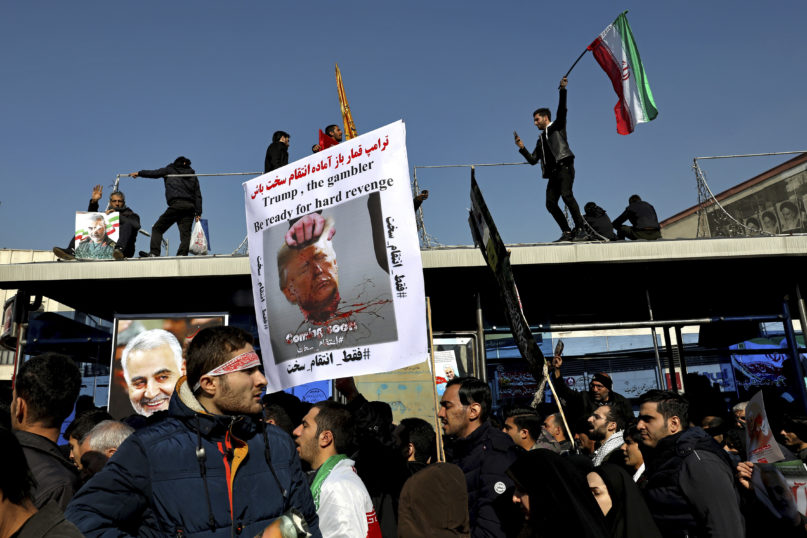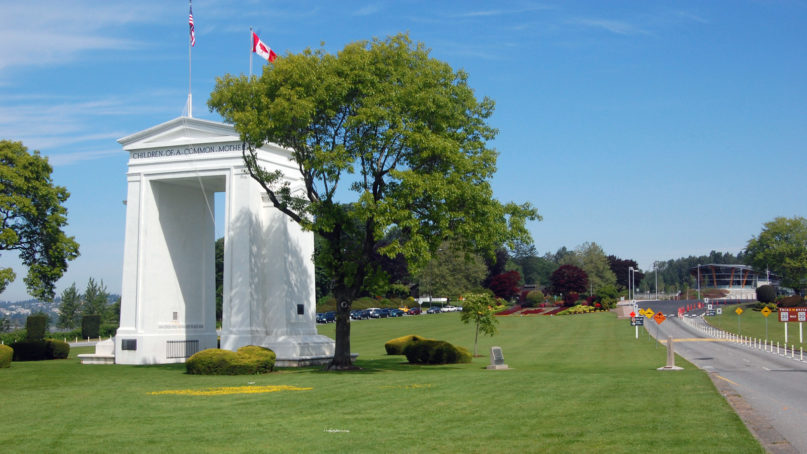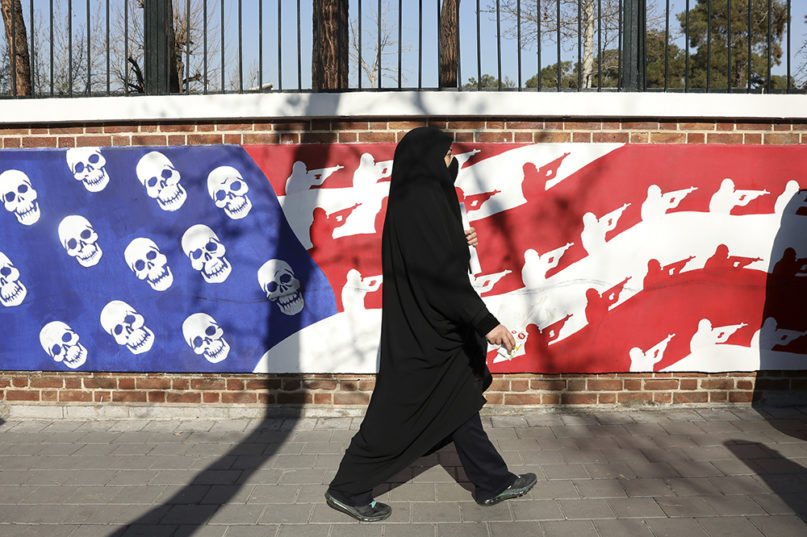(RNS) — Amid reports that dozens of Iranian Americans were detained and questioned for hours at the U.S.-Canada border while returning home over the weekend, civil rights experts say they fear an environment of increased scrutiny, surveillance and harassment against Iranian Americans by law enforcement.
When one family among the more than 60 people of Iranian heritage detained Saturday (Jan. 6) at Peace Arch Border Crossing in Blaine, Washington, asked a border agent why they were being detained, the official allegedly responded, “This is a bad time to be an Iranian.”
Iranians in America have been caught in the crossfire of U.S.-Iran tensions for decades, advocates say.
“Iranian Americans have always been a target, given the relationship between the U.S. government and Iran,” explained Azadeh Shahshahani, who works as the legal and advocacy director for Project South. “This is definitely going to intensify the targeting of Iranian and Muslim communities.”
Since 2016, many Iranian Americans have reported being unable to use popular payment processing apps, which block payments that include words like “Persian” and “Iran” due to sanctions against Iran. By January 2019, Trump’s travel ban against Iran had already kept out around 1,000 spouses and fiances and 500 minor children of U.S. citizens, according to one estimate.
Stories of affected families include an Iranian scientist kept apart from her husband despite an offer for a U.S. postdoctoral research position; an elderly woman unable to see her granddaughter graduate law school; a 4-month-old baby whose heart surgery was delayed due to the ban; 20 Iranian families who sued the Trump administration last year over delays in processing travel ban waivers; and the more than 100 Iranian Christians, as well as other Iranian asylum seekers and vetted refugees scheduled to be resettled in the U.S., stuck in legal limbo due to the ban.
Now, as geopolitical tensions escalate even further after the U.S.’ killing of Iranian military commander Qassem Suleimani and Iran’s promise of retaliation, advocates say the obstacles in place for Iranian Americans going about their daily lives may likely increase as well.

Mourners attend a funeral ceremony for Iranian Gen. Qassem Suleimani and his comrades, who were killed in Iraq in a U.S. drone strike on Friday, at the Enqelab-e-Eslami (Islamic Revolution) square in Tehran, Iran, Monday, Jan. 6, 2020. The processions mark the first time Iran honored a single man with a multi-city ceremony. Not even Ayatollah Ruhollah Khomeini, who founded the Islamic Republic, received such a processional with his death in 1989. Suleimani on Monday will lie in state at Tehran’s famed Musalla mosque as the revolutionary leader did before him. (AP Photo/Ebrahim Noroozi)
“Policy-makers and opinion leaders should exercise caution at this tense and critical moment,” CAIR Senior Litigation Attorney Gadeir Abbas said in an advisory issued to Iranian, Syrian and Iraqi Americans on Monday (Jan. 6), which noted “vague threats” about so-called sleeper cells in the U.S. controlled by Iran. “We must not allow fear-mongering war rhetoric to endanger our fellow Americans, whatever their faith or heritage.”
“In the wake of recent events, it is very likely that U.S. government agencies will attempt to question and/or conduct intelligence gathering efforts with respect to Iranian communities in the United States,” Ramzi Kassem, director of CUNY’s CLEAR Project legal clinic focused on post-9/11 law enforcement accountability, tweeted.
A slew of lawyers and advocacy organizations, including CLEAR Project, Project South, Council on American-Islamic Relations and the National Iranian American Council have offered legal support to any Iranian or Iranian American detained or questioned due to their nationality.
“We see this time and time again, whenever there is something happening overseas that concerns the U.S., the FBI gets involved domestically with surveillance targeting people from those regions,” said Shahshahani, who has begun monitoring reports of Iranian Americans being questioned or detained at Southern airports and border crossings. “So this is to be expected now that the Trump administration is marching toward a war with Iran.”
Already, law enforcement agencies in major cities are on high alert. The police department in Los Angeles, home to the world’s largest Iranian population outside of Iran, issued an alert soon after the strike on Suleimani, urging “every Angeleno to say something if you see something.”
That sort of language promotes undue suspicion of the country’s Iranian diaspora, a community that the Trump administration has “opened up to abuse,” said Mana Mostatabi, communications director at the National Iranian American Council.
“It’s critical for our lawmakers and law enforcement right now to be very nuanced and careful in their language,” Mostatabi said. “If you look at the way this administration has been acting, we’re being painted as enemy No. 1, even though Iranian Americans are taxpayers and we contribute greatly to U.S. society.”
The detentions of Iranian Americans at the U.S.-Canada border this weekend have set the tone for the upcoming weeks and months, she said. A contact of hers at the Department of Homeland Security suggested that the border stops were the beginning of a “concerted effort to harass, intimidate and embarrass Iranian Americans,” Mostatabi said.
“Whether this is some rogue officers or something passed down from the top, it certainly sets a really dangerous precedent that we can now detain American citizens and that the agencies responsible for protecting us are trying to circumvent responsibility for what they’ve done,” Mostatabi said. “The precedent has been set, and it is escalating. It wouldn’t be surprising if this is just the beginning and we see additional targeted harassment.”
On Saturday, Iranian Americans stopped by CBP at the Washington-Canada border claimed they had their passports confiscated and were questioned about their political views and allegiances, with some detained for up to 11 hours, according to the Council on American-Islamic Relations’ Washington chapter.

The Peace Arch Border Crossing in Blaine, Washington. Photo by US Embassy Canada/Creative Commons
CAIR-WA said its legal team is assisting travelers who were “detained at length and questioned,” many of whom were returning from a Persian pop concert in Vancouver by the group Masih & Arash Ap. Some travelers reported being questioned about their birthplace, their employment history, their social media accounts and whether they had been members of the Iranian Revolutionary Guard Corps.
CAIR-WA claimed that, per a source at CBP, the Department of Homeland Security has “issued a national order to CBP to ‘report’ and detain anyone with Iranian heritage entering the country who is deemed potentially suspicious or ‘adversarial,’ regardless of citizenship status.”
U.S. Customs and Border Protection has disputed these allegations, saying reports that CBP is “detaining Iranian-Americans and refusing their entry into the U.S. because of their country of origin are false,” as are reports that the DHS has issued any such directive.
Instead, CBP confirmed to media that “secondary screenings” were performed, noting the agency was operating with “enhanced” security measures at U.S. ports of entry for national security reasons but chalking up delays at the border to holiday-related traffic and staffing shortages.
Civil rights advocates argue that CBP’s denial was carefully worded to ignore the larger issue at hand.
“I think they’re actually using semantics,” Mostatabi argued. “They’re saying it’s false that they’re ‘detaining and refusing entry’ — I think they’re using the ‘and refusing entry’ part to walk around (what) they’ve actually done, which is that they held permanent residents and American citizens for up to 16 hours.”
Shahshahani said she hoped that Americans of all ethnic and religious backgrounds would lead nationwide protests against potential policies affecting Iranians and Iranian Americans, as thousands did at airports after Trump instituted his travel ban.
“I mean, should I expect to be questioned extensively on my next trip and maybe even not be allowed to enter?” Shahshahani asked. “This is shocking. It is just abhorrent that this is now happening to people of Iranian descent.”
Representatives from Church World Service said they are “deeply troubled” by the reports and called on Congress and the Department of Homeland Security’s Office of Civil Rights and Civil Liberties to investigate the claims.
“Questioning and detaining the political views and allegiances of Americans with perceived foreign backgrounds echoes some of the darkest times in our nation’s history and is akin to Japanese-American internment,” Church World Service said in a statement. “Iranian-Americans are already impacted by the administration’s unjust and discriminatory Muslim and refugee bans.”
Washington State Gov. Jay Inslee said his office is monitoring the reports and that the Department of Homeland Security denied to him that they issued an order to detain or refuse entry to Iranian Americans. Washington Congresswoman Rep. Pramila Jayapal said her office was also investigating the reports. If true, she said, “the Administration would be following its dangerous foreign policy decisions with dangerous policies here at home.”
CAIR-WA’s statement also quoted a 24-year-old medical student who said she was kept at the crossing for over 10 hours.
“We kept asking why we were being detained and asked questions that had nothing to do with our reason for traveling and was told, ‘I’m sorry this is just the wrong time for you guys,’” the woman, whose name was given as Crystal, said, according to the statement.
In a separate incident, John Ghazvinian, a University of Pennsylvania historian of U.S.-Iran relations, reported that he was questioned about his feelings on the political situation with Iran when he landed on Sunday (Jan. 5) at the John F. Kennedy International Airport in New York City.





